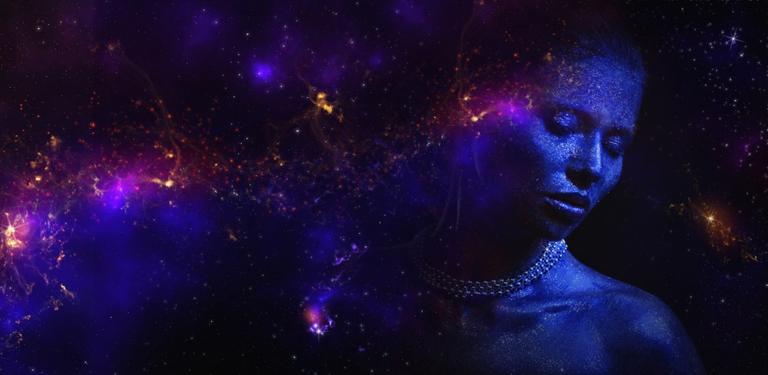It is a small experiment in creativity, you choose a word, search a free resource site for the image or photograph that results in a list, and then write a short narrative about it.
The word chosen was: Avatar

This time, I'm going to break a bit with what I normally do in creativity exercises. You see, when I came across this word and imagined it, I remembered that I have a text in Spanish that I wrote some time ago, so I thought about translating it and giving it a new use.
The lecturer went to his position on the stage, looked at the preparations and, being sure that everything was ready, began with his speech.
In one of the traditions of India, an avatar is the embodiment of a divinity, its physical manifestation in a given reality. In the current context, this definition loses much of its sacred content and goes to a more psychological and earthly point. In the era in which we live, an avatar is the designation of a representation of our person in an electronic medium, be it a chat room, a cell phone, a discussion forum, a mailing list or any other area.
At the beginning, the existence of static avatars must be pointed out, which are simple images that contain elements or features that identify us in some specific generic aspect, the essential thing is that as users we assume such identity between my bodily self and the virtual self. But thanks to the advancement of technologies we do not have to limit ourselves to the static, we then consider animated avatars, starting the presentation with the simplest in terms of their technology, which are animated images, among which the files of GIF extension, some PNG variants or even the ANI extension animated pointers.
For many members of his audience, what this speaker was mentioning was ancient history, or even more, a tale of prehistory.
The initial animated avatars are themselves repetitive, non-interactive images, they are cyclical and do not react to their environment, their representation of the self is a little more attractive, but it is still very limited, after all: "I am me based on existence of another", this axiom does not seek in its center the denial of otherness, but its usefulness to build our identity, we discover what we are by seeing in others what we are not, differentiation is one of the psychological needs that are revealed in the development of our personality from an early age can be the trigger for serious crises such as the separation of the mother from an infant, when the "first world" or "first stage of human life" breaks, a stage in which "Mother - I" It was a single functional unit.
The interaction raises the possibility of making our representation or avatar respond to the emotional and volitional conditions of the environment in which it unfolds, in such a way then, if you have an avatar based on old flash technology with a series of command lines that allow you to respond to my actions and those of other users in the same communication channel, you can see that when placing the onomatopoeia of a laugh you see the avatar laugh, a happy face when performing a couple of keystrokes or a click Mouse places a radiant face on my avatar, so my electronic self shows others a better representation of my bodily self.
The technology of animated and interactive avatars was not very widespread, but it has roots from chat rooms based on cartoons. A progress to be expected is the massification of this type of communication and its expansion with a pre-programmed response database by its users, in this way, if you leave me a message in my forum, my avatar can react by thanking a suggestion or compliment, or putting on a face of few friends if they send me a blamer or flamer (serious offense and very hot).
The topics became heavy and it was dangerous for the audience to lose interest, so he had to pick up the pace a bit.
The use of databases of responses leads to raise a personality or the ability to simulate having your own personality, in this you have to consider the bots. At the beginning these electronic entities were parts of codes of simulated environments, games par excellence, where they performed limited and specific functions, usually they were the bad guys on duty that we had to crush until completing the missions, according to their degree and range of responses they could be classify into simple soldiers (cannon fodder, with the pardon of the term) or bosses (With a greater range of responses and a certain ability to interact with our actions to seek to eliminate ourselves).
The Bots gained better terrain by developing systems with more advanced artificial intelligence, so they could serve as allies or ambush the players, personally, I remember a game of "shoot and kill everything that moves" in which the enemies if they shot each other by accident they ran into enemies and dedicated themselves to killing each other, an issue that I encouraged to save myself the bullets and avoid injuries. It was preferable that twenty enemies were killed between them and then I would take care of what was left, instead of going in as a "suicide hero" than for them to give me all the bullets.
That final sentence was said with an evident tone of humor, to try to move the audience a bit and keep them awake.
With the advent of third-dimensional games, avatars were also developing, at a point they could give real surprises even to good players with experience in a specific game.
Well, recapping, an avatar is my representation in a virtual medium, a bot is an electronic entity with a personality (or rather pseudo-personality) of its own, but what happens when I mix both, here comes an entity that for many is science fiction , it is an angel. Although some say they are a particular type of Daemons, which is a more common term in computer systems programming, for now I prefer to keep using the word angel for these particular things.
He was already entering the final stretch.
Angel is the word used to designate a representation of an "I", an artificial existence that is endowed with a certain level of independence in its actions, reaching a very wide range of criteria and decisions, utility These creations are of various kinds, in certain cases they are excellent keepers and guard the access doors to a system, they are called fire angels, in other circumstances and with particular characteristics they can transmit data through not very regular channels and bypassing defenses and protections , they are often called water angels.
The classification of angels is a separate issue, in this case what interests me is to raise the problem that these electronic creatures are a representation of their creator, but are not strictly dependent on the personality of the same once released. A skillful programmer can create angels and forget about their existence, being simply alerted when one of them is deleted or destroyed, a matter that would signal a failure or an attack, in either case the angel would have acted without consulting its creator, but complying with the purpose for which it was created, since within its "personality" that is the reason for its existence
He still had some of the public's attention and it was time to close the conference.
Between a reflection of the "I" and the "Other", among the multitudes of reflections that I can create in an electronic medium, the question of "who am I?" Remains open. Each creation can ask itself such a question if its system is strong enough to support such internal data processes, but it terrifies me a bit to think how an angel out of my hands could reflect with respect to itself
What would I be for such a being? His father? His God? Would your identity be yours or mine? Would I be its root and it my flower? This problem is difficult to pose, but it is interesting.
I hope the topic arouses your interest and we will see you in the next session.
The lecturer disconnected his system and relaxed a bit, he had already finished his part and had to prepare the material for his next session, with another group, and which would take place in just under an hour, he still had a lot of work to do. Luckily, he could do it remotely.


Much more than a browser. Enjoy private, secure and fast browsing with Brave